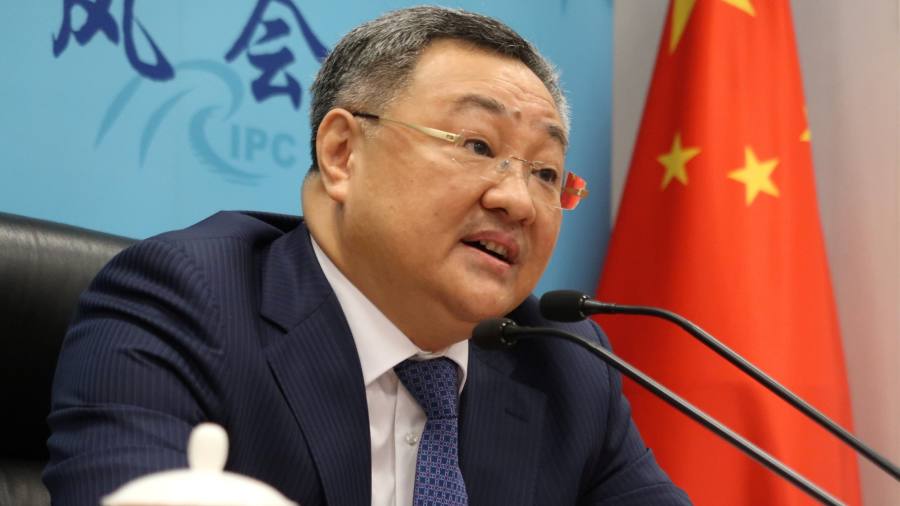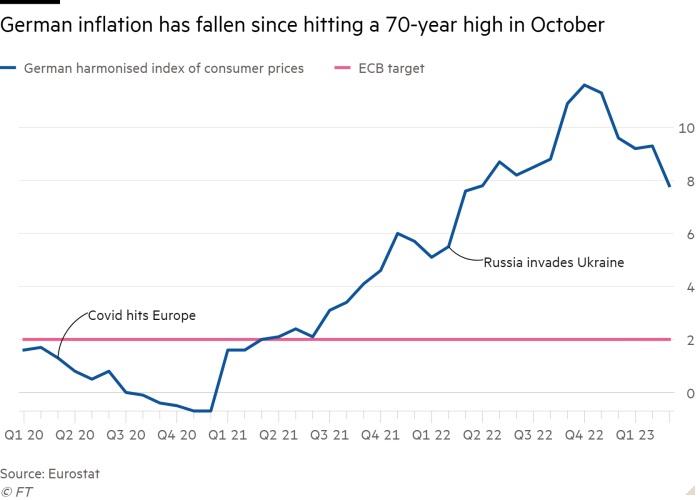
This article is an on-site version of our Europe Express newsletter. Sign up here to get the newsletter sent straight to your inbox every weekday and Saturday morning
Good morning. First, chilling news from Russia. Evan Gershkovich, an American reporter for the Wall Street Journal, has been arrested and sentenced to two months pre-trial detention on espionage charges. Evan is a journalist, not a spy. Journalism is not a crime.
Also, minutes after we sent yesterday’s email saying that negotiations were ongoing, a deal was struck between EU countries on including nuclear power in a new law on renewable energy targets. The final compromise? C’est très compliqué.
Today, I interpret clashing rhetoric from Brussels and Beijing on the future of the EU-China relationship, while our Nordic correspondent sketches out the ultra-tight Finnish election this Sunday where incumbent premier Sanna Marin is under threat from two fronts.
Duelling narratives
European Commission president Ursula von der Leyen said yesterday that Europe should adopt “defensive tools” to protect itself from China.
China, however, thinks the EU should stop listening to the US, and realise its interests lie in more, not less, economic engagement.
Context: The EU’s relations with China are in a state of flux. Brussels officially defines China as a partner, a competitor and a rival — all at the same time. That reflects both a more open-minded approach to Beijing than the US, and deeper economic ties. But Brussels is under increased pressure from Washington to get tougher.
Talking to the Financial Times just moments before von der Leyen gave a speech laying out her own (rather more hawkish) view of the relationship, China’s ambassador to the EU Fu Cong was clear that Beijing thought Brussels was dancing to Washington’s tune, and sacrificing its own economic interests.
“We know that the US is putting a lot of pressure on European countries . . . to create obstacles for normal trade,” Fu said. “The United States will stop at nothing in trying to prevent a normal relationship between China and the EU. And we firmly believe that this is not in the interests of the [EU].”
Fu’s words of caution were tinged with veiled threat. Citing the Netherlands’ decision to follow the US in curbing exports of chip technology to China, and reports that the EU could collectively adopt a similar measure, he said Beijing “cannot just sit there and see its own interests being trampled”.
“Other countries will see how the European companies and European governments are acting,” he added. “And so even for their own image, for their own credibility, they need to be careful.”
There’s much at stake. Von der Leyen goes to Beijing next week, and there’s a large variation among EU member states on how the relationship should be recalibrated, if at all.
Perhaps Fu’s most pertinent argument was his assessment that European businesses are very enthusiastic about investing in China, and that the continent’s politicians should not “work against this sentiment”.
“Who in their right mind would abandon such a thriving market as big as China?” he said, posing the €860bn question. “It will only be at their own peril.”
Chart du jour: The big ease

Inflation tumbled in Germany and Spain this month, on a sharp drop for energy costs in two of Europe’s largest economies.
Three-way battle
Nail-biter is a term bandied around frequently about elections, but Finland’s on Sunday truly merits the term, writes Richard Milne.
No fewer than three parties are fighting it out for first place, and all three have been within the margin of error for victory over the past few weeks.
Context: Prime Minister Sanna Marin’s Social Democrats have won plaudits for their handling of the Covid-19 pandemic and the journey to Finland’s impending Nato membership. But polls have long suggested victory for the conservative National Coalition party. In recent weeks, it has become a three-way race as the anti-EU, anti-immigration Finns party have joined the contest.
“I can’t recall it has been so tight ever. It’s intriguing,” says Hanna Wass, professor at the University of Helsinki.
The winner usually gets first go at forming the government and if either the Finns or National Coalition win, analysts expect a rightwing coalition that will focus on spending cuts amid the ongoing Finnish obsession with government debt levels.
Marin has railed against what she derides as her rivals’ focus on austerity and instead talks about the importance of growth and investments. But she may well end up needing arch-rival National Coalition to form a viable government.
The Finns, who would like a Fixit, do not see eye to eye with National Coalition on the EU but could compromise if they could get their way on migration, experts think.
Everything suggests it will be both a tense election evening, and tense government formation talks afterwards.
What to watch today
-
Spanish prime minister Pedro Sánchez meets Chinese president Xi Jinping in Beijing, around 10am CET.
-
EU competition commissioner Margrethe Vestager meets with US treasury secretary Janet Yellen in Washington.
Now read these
Recommended newsletters for you
Britain after Brexit — Keep up to date with the latest developments as the UK economy adjusts to life outside the EU. Sign up here
Trade Secrets — A must-read on the changing face of international trade and globalisation. Sign up here
Are you enjoying Europe Express? Sign up here to have it delivered straight to your inbox every workday at 7am CET and on Saturdays at noon CET. Do tell us what you think, we love to hear from you: [email protected]. Keep up with the latest European stories @FT Europe